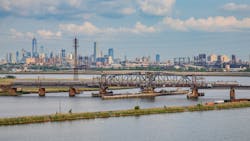NJ Transit submits revised Portal North Bridge financial plan to FTA
New Jersey Transit submitted an updated financial plan for the Portal North Bridge Project to the Federal Transit Administration (FTA) on Sept. 13. NJ Transit says the plan addresses concerns from the United Station Department of Transportation and FTA over whether enough funding sources were identified and committed in the proposal to meet project costs and potential cost overruns.
NJ Transit says the revised plan makes more local money available for the project while keeping costs in check.
“The Portal North Bridge Project is indispensable to the efficient operation of the Northeast Corridor and the safe, unimpeded flow of people, goods and services across the Hackensack River,” said New Jersey Gov. Phil Murphy. “With today’s revised financial submission by NJ Transit, the state of New Jersey has made a clear commitment to ensuring that this project of national significance moves forward. I applaud NJ Transit for the strength of this submission, and look forward to working with our federal partners.”
NJ Transit is the project sponsor in partnership with Amtrak. The agency had committed $600 million dollars to the project previously and is seeking approximately $811 million in federal dollars to complete the project. NJ Transit and Amtrak have worked together to identify and commit specific funding sources for the project. Amtrak has also committed an additional $55 million from passenger revenues toward project costs. These funds are in addition to the December 2018 agreement between NJ Transit and Amtrak that provided another $182 million for projects in New Jersey such as the Portal North Bridge Project.
“We are confident NJ Transit has made our application even stronger by addressing the issues raised by the federal government,” said Kevin Corbett, president and CEO of NJ Transit. “We look forward to a prompt review that will improve the project rating and move us closer to a Full Funding Grant Agreement and the start of major construction.”
He continued, “We’ve worked hand in hand with Amtrak to address the feedback from the FTA and USDOT, and believe they will look favorably on the revisions to the Project financial plan. The Portal Bridge is vital to passenger transportation between New Jersey and New York, as well as the entire Northeast Corridor (NEC) between Washington D.C and Boston. Due to its age, design and current condition, the bridge is a single point of failure on the NEC. We look forward to approval from the FTA so we can move forward to construction.”
More than 450 Amtrak and NJ Transit trains use the Portal Bridge per day with NJ Transit carrying approximately 90,000 customers on an average weekday. When the 108-year-old swing span bridge fails to close properly, delays can be significant and cascade throughout the region.
“In 2019, the entire Northeast corridor simply shouldn’t be relying on a 108-year-old swing bridge that gets stuck and causes delays even when it’s working properly,” said Gateway Corporation Chairman Jerry Zaro. “The FTA needs to recognize everything that’s been done to strengthen this financial plan – including providing 100 percent of the local share of funding, increasing the amount of monies available to the project to cover contingencies and completing early work on time and on budget – and move Portal North Bridge toward a full funding agreement so 200,000 daily passengers can finally stop worrying if a failing bridge is going to make them late to work or unable to get home for dinner.”
Design is complete on the replacement Portal North Bridge, which will be a high-level, fixed span bridge that will allow marine traffic to pass underneath without interruption to rail traffic. Once full construction begins, NJ Transit estimates the new bridge will take approximately five years to complete.
About the Author

Mischa Wanek-Libman
Group Editorial Director
Mischa Wanek-Libman is director of communications with Transdev North America. She has more than 20 years of experience working in the transportation industry covering construction projects, engineering challenges, transit and rail operations and best practices.
Wanek-Libman has held top editorial positions at freight rail and public transportation business-to-business publications including as editor-in-chief and editorial director of Mass Transit from 2018-2024. She has been recognized for editorial excellence through her individual work, as well as for collaborative content.
She is an active member of the American Public Transportation Association's Marketing and Communications Committee and served 14 years as a Board Observer on the National Railroad Construction and Maintenance Association (NRC) Board of Directors.
She is a graduate of Drake University in Des Moines, Iowa, where she earned a Bachelor of Arts degree in Journalism and Mass Communication.
